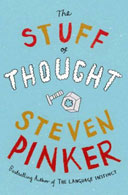
The Stuff of Thought: Language as a Window into Human Nature
by Steven Pinker
Allen Lane, £25, pp512
This is the experimental psychologist Steven Pinker's seventh book on the workings of the human mind. Each one has been packed with more ideas, information and original thought than most writers will assemble in a whole career. And each one is a significant contribution to the business of understanding how we got to be us, with all our unlikely habits and unfathomable behaviour.
Pinker has a talent for accessible analogy and the apposite observation - when writing about how quickly toddlers learn language, he notes, 'What tourist isn't momentarily amazed at how well the little children in France speak French!' And like a seasoned tour guide, he leads his audience with reassuring summaries of where he's taking us: 'We will learn how the mind conceives of bodies and persons... and how it deals with three dimensions of space.'
Yet for all his success as a popular science writer, Pinker is not easy work, and never less so than in The Stuff of Thought. The stuff in question is language, what the subtitle describes as a 'window into human nature'. What does the way we construct language, asks Pinker, say about the way in which we think?
It's a subject he's explored in some depth before, but here he is at his most intellectually peripatetic. One moment he is grappling with the meaningful minutiae of verb constructions, the next explaining why we say 'shit' instead of 'prick' when we bump our heads.
Taking a lead from Pinker and focusing on the language, it's fair to conclude that the word 'stuff' in the title is something of a giveaway. It's vague, inclusive and indeterminate, allowing anything and everything language-related to gain entry to the debate. This is both exhilarating and a little tiresome. You can't help but admire the breadth of Pinker's inquiry, but at the same time wonder at the point. Sometimes you long for a narrative thread that would tie all the stuff together.
Pinker might argue that the brain is not like that and nor, therefore, is language. You have to search for clues wherever you can find them. Yet the Harvard professor demonstrates a frustrating reluctance to go from A to B if there's any chance of a detour to Z.
In an early chapter, Pinker asks us to consider why some verbs are both content- and container-locative. For example, we can say, 'Jared sprayed water on the roses,' and also, 'Jared sprayed the roses with water.' But other verbs only allow one option. You can say, 'Amy poured water into the glass,' but not, 'Amy poured the glass with water.' Why? And how do children learn so quickly what all the exceptions are?
Pinker first suggests there is no rule that explains why some verbs are suitable for locative alternation and others are not, and thus sends us off down a series of grammar-filled psycholinguistic dead ends before revealing that there is in fact a rule that distinguishes 'spray' from 'pour'. One transforms the object and the other does not. But by the time you've been guided back to this simple conclusion, you're sufficiently disoriented as to want to pose another psycho-linguistic teaser: Why did the wild goose cross the road? Because it was being chased by Pinker.
The chapter that many readers will find most interesting covers swearing. Did you know that 'gee whiz' and 'jeepers creepers' were bowdlerised versions of 'Jesus', or that 'crikey' and 'cripes' perform the same job for 'Christ'?
Religion once provided the taboo words for English, but the Reformation began the process that removed their power to shock. In Catholic countries, the inhibition remains. One of the key words used by Spanish-speaking Tourette's sufferers is hostia, the communion wafer. It was comedian Lenny Bruce's dream to do for sexual profanity what the Protestants had done for religious blasphemy - render it harmless. Moreover, he thought by removing the stigma from sex slang, the sex act would also be liberated from moral judgment. But sexual language is now more common and so are 'illegitimacy, sexually transmitted infections, rape and the fallout from sexual competition, like anorexia in girls and swagger culture in boys'.
We use specific words, argues Pinker, for deep-rooted psycho-cultural and evolutionary reasons, even, it seems, when we don't use them.

